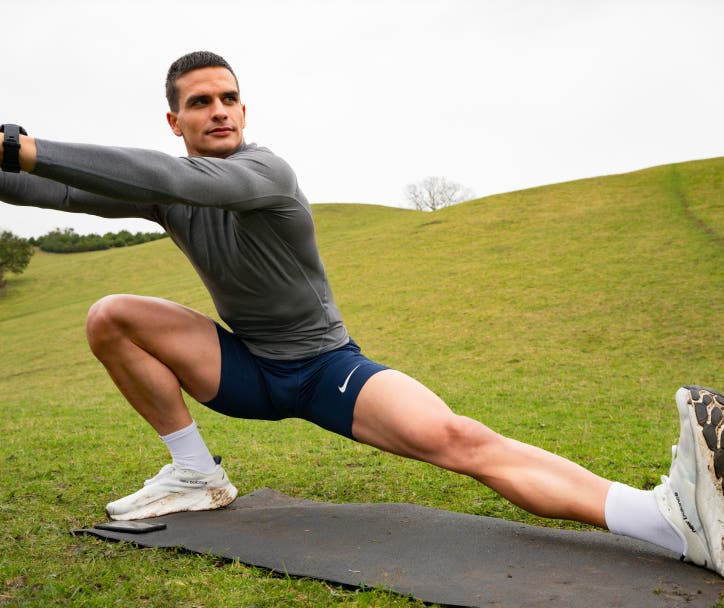Magnesium is a poster child for “small yet mighty.” It’s an essential mineral – meaning our bodies can't produce it – so we need to fuel up with our diets.
And magnesium is a big deal, especially for athletes, because it supports muscle contractions, neuromuscular conduction (when the brain signals the muscles to contract), glycemic control, blood pressure regulation, and myocardial contraction (the squeeze action of the heart to pump blood through the body).
That's not all - magnesium also plays a vital role in various immune responses and has a significant anti-cancer effect.2 Talk about a jack of all trades!
Without the right balance of magnesium, many areas of the body are at risk of malfunction and even illness.1 This is the last thing you want or need if you're working hard to meet your fitness goal.
To perform at your best, you need magnesium at an optimal level. Let's dive into why magnesium is important for athletes and how to keep its levels primed for performance.

Why magnesium is important for athletes
Magnesium boasts a ton of benefits, and because it’s involved in so many biochemical reactions in the body, including energy production and storage, it's even been studied as an “ergogenic aid,” or a performance enhancer.
Let’s take a closer look at some of the specific health benefits of magnesium for athletes.
Magnesium and muscle function
Magnesium is vital for regular muscle contraction and relaxation. One key example: maintaining a healthy heartbeat.
So how does it work? It’s an intricate process, but essentially, magnesium competes with calcium to generate your heartbeat – namely, the contraction and relaxation of the heart’s muscles. Calcium entering your heart’s muscles initiates contraction, but magnesium does the opposite. It relaxes the muscles, contributing to a regular, healthy heartbeat. Boom boom.
The same is true for your skeletal muscles. Calcium binds to specific receptors to signal the muscle to contract, while magnesium competes with the binding sites in the muscles to cause the muscles to relax.5
A lack of magnesium can lead to muscle cramping. And if you’ve ever had a sudden, painful cramp, you know all too well that this is something to steer clear of. So, if you regularly battle cramps during training, you might want to check your magnesium intake.6
Magnesium and energy production
Magnesium is needed to convert food into energy by helping to make ATP, the body's energy currency. Magnesium binds to ATP to make a biologically active molecule capable of powering certain cellular functions, including muscle contractions.7 Get the Energy Systems 101 in our beginner’s guide here.
As an athlete, this process is key to helping you perform at your desired intensity and duration. But magnesium doesn't stop there—it also helps the body use carbohydrates and fats efficiently for energy.
So if you're getting your magnesium just right, you're helping your body get the energy it needs.
Magnesium and electrolyte equilibrium
Magnesium is an example of an electrolyte, an electrically charged molecule that regulates several body functions. It works alongside other electrolytes, like calcium, potassium, and sodium, to balance fluid levels, maintain blood pressure, help rebuild damaged tissues, and maintain muscle function.
To avoid dysfunction, electrolytes must be balanced, but imbalances still occur. This can happen when electrolyte levels become too high or too low, often due to fluctuations in the body's water content, such as during sweating.
This is why finding that electrolyte balance, or replenishing them as needed, is key to keeping unwanted side effects like cramping and fatigue at bay during your workouts.
Magnesium, sleep, recovery, and rest
Sleep is an important topic for athletes and the average person alike. Many people worldwide struggle with poor sleep quality, which is linked to various negative health effects.10 There is some research showing that compared to placebo, magnesium supplementation increases sleep time, quality, and the production of melatonin, the hormone responsible for regulating our sleep/wake cycle.11
A further study involving almost 4,000 adults concluded that magnesium promotes better sleep quality and that you’re more likely to sleep longer.12 This is an athlete’s dream come true. When you sleep better, you can perform better, and you’ll get that much closer to achieving your goals.

What are good dietary sources of magnesium?
Magnesium is present in a variety of food groups and is everywhere in our diets, making it easy to hit those daily intake goals.
Some examples of magnesium-rich foods include:
- Leafy green vegetables: Spinach, kale, arugula, chard
- Nuts: Almonds, Brazil nuts, hazelnuts, walnuts, cashews
- Seeds: Flax, sesame, chia, pumpkin
- Fruit: Avocado, bananas
- Fish and shellfish: Salmon, sardines, tuna, prawns, cod
- Wholegrains: Quinoa, Bulgar wheat, wholegrain brown rice
- Legumes and beans: Edamame, soya beans, chickpeas, kidney beans, pinto beans, red lentils
- Dairy products: Milk, yogurt
If you’re a chocoholic (in love with chocolate), try swapping your favorite milk chocolate bar for a dark chocolate variation. It’s a great way to add a magnesium-rich boost to your sweet treat indulgence. Plus, dark chocolate is full of antioxidants, so it can help reduce oxidative stress. We’d call that a win-win.
Although magnesium deficiency is common, it’s also readily available in many foods. Make an active effort to incorporate some of these foods daily, and you’ll be well on your way to meet your dietary needs.
How do I know if I’m low on magnesium?
Magnesium deficiency, known as hypomagnesemia, is often overlooked because the signs that your magnesium tank is low can overlap with other conditions. Nevertheless, low magnesium levels can bring on some unpleasant (and certainly unwanted) symptoms.11
Common symptoms to look out for, include:
- Fatigue
- Muscle weakness and tremors
- Headaches
- Depression
- Diarrhea
- Abnormal heart rhythm
- Loss of appetite
- Nausea1,13

When should I consider magnesium supplements?
Above all, prioritize a well-balanced diet to fulfill your magnesium needs. Can you swap in some spinach for your salad greens or sprinkle some pumpkin seeds on your yogurt?
In some cases, you may still need to up your magnesium game and might look to supplement your intake. This can be especially true if you frequently experience muscle cramps, exercise regularly, or sweat a lot.
If you’re experiencing magnesium deficiency symptoms, we recommend consulting with your doctor before taking supplements, to rule out any other causes.
Different types of magnesium supplements
Not all magnesium supplements are created equal. Buying the first one you see could have dire consequences – and could have you dashing for the nearest toilet. So, here are some pros and cons for the different types of supplements available.
Magnesium glycinate is magnesium combined with the amino acid, glycine.
Pros - Highly bioavailable. Associated with few side effects.
Cons - Often more expensive.
Magnesium malate is made by combining magnesium with malic acid.
Pros - Highly bioavailable. Less likely to cause digestive effects. Used to treat chronic fatigue and fibromyalgia.
Cons - Often more expensive.
Magnesium citrate is magnesium combined with citric acid.
Pros - Good bioabsorption and bioavailability. Common and inexpensive.
Cons - Associated with digestive side effects, like diarrhea.
Magnesium oxide is one of the most common magnesium supplements sold. Typically used in cheaper supplements.
Pros - Used to treat migraines and constipation.
Cons - In large doses, can cause hypermagnesemia (high magnesium levels). Can cause digestive side effects. May interact with other medications.
Let’s recap
From aiding energy production to ensuring normal muscle function, magnesium's impact on the body is significant and shouldn’t be overlooked, especially for athletes.
Fill your plate with magnesium-rich foods and sprinkle in magnesium supplementation when necessary to elevate performance and discover how even small nutrients can make a big impact.
Sources
[1] Al Alawi AM, Majoni SW, Falhammar H. Magnesium and Human Health: Perspectives and Research Directions. Int J Endocrinol. 2018 Apr 16;2018:9041694. doi: 10.1155/2018/9041694. PMID: 29849626; PMCID: PMC5926493.
[2] Ashique S, Kumar S, Hussain A, Mishra N, Garg A, Gowda BHJ, Farid A, Gupta G, Dua K, Taghizadeh-Hesary F. A narrative review on the role of magnesium in immune regulation, inflammation, infectious diseases, and cancer. J Health Popul Nutr. 2023 Jul 27;42(1):74. doi: 10.1186/s41043-023-00423-0. Erratum in: J Health Popul Nutr. 2023 Nov 2;42(1):117. PMID: 37501216; PMCID: PMC10375690.
[3] Office of dietary supplements - magnesium (no date) NIH Office of Dietary Supplements. Available at: https://ods.od.nih.gov/factsheets/Magnesium-HealthProfessional/ (Accessed: 26 March 2024).
[4] Volpe SL. Magnesium and the Athlete. Curr Sports Med Rep. 2015 Jul-Aug;14(4):279-83. doi: 10.1249/JSR.0000000000000178. PMID: 26166051.
[5] Potter, J. D., Robertson, S. P., & Johnson, J. D. (1981). Magnesium and the regulation of muscle contraction. Federation proceedings, 40(12), 2653–2656.
[6] Bilbey, D. L., & Prabhakaran, V. M. (1996). Muscle cramps and magnesium deficiency: case reports. Canadian family physician Medecin de famille canadien, 42, 1348–1351.
[7] Schwalfenberg GK, Genuis SJ. The Importance of Magnesium in Clinical Healthcare. Scientifica (Cairo). 2017;2017:4179326. doi: 10.1155/2017/4179326. Epub 2017 Sep 28. PMID: 29093983; PMCID: PMC5637834.
[8] Setaro, L., Santos-Silva, P. R., Nakano, E. Y., Sales, C. H., Nunes, N., Greve, J. M., & Colli, C. (2014). Magnesium status and the physical performance of volleyball players: effects of magnesium supplementation. Journal of sports sciences, 32(5), 438–445. https://doi.org/10.1080/02640414.2013.828847
[9] Consolazio, C.F. et al. (1963) ‘Excretion of sodium, potassium, magnesium and iron in human sweat and the relation of each to balance and Requirements’, The Journal of Nutrition, 79(4), pp. 407–415. doi:10.1093/jn/79.4.407.
[10] Chattu, V. K., Manzar, M. D., Kumary, S., Burman, D., Spence, D. W., & Pandi-Perumal, S. R. (2018). The Global Problem of Insufficient Sleep and Its Serious Public Health Implications. Healthcare (Basel, Switzerland), 7(1), 1. https://doi.org/10.3390/healthcare7010001
[11] Abbasi, B., Kimiagar, M., Sadeghniiat, K., Shirazi, M. M., Hedayati, M., & Rashidkhani, B. (2012). The effect of magnesium supplementation on primary insomnia in elderly: A double-blind placebo-controlled clinical trial. Journal of research in medical sciences : the official journal of Isfahan University of Medical Sciences, 17(12), 1161–1169.
[12] Zhang, Y., Chen, C., Lu, L., Knutson, K. L., Carnethon, M. R., Fly, A. D., Luo, J., Haas, D. M., Shikany, J. M., & Kahe, K. (2022). Association of magnesium intake with sleep duration and sleep quality: findings from the CARDIA study. Sleep, 45(4), zsab276. https://doi.org/10.1093/sleep/zsab276
[13] Schwalfenberg GK, Genuis SJ. The Importance of Magnesium in Clinical Healthcare. Scientifica (Cairo). 2017;2017:4179326. doi: 10.1155/2017/4179326. Epub 2017 Sep 28. PMID: 29093983; PMCID: PMC5637834.